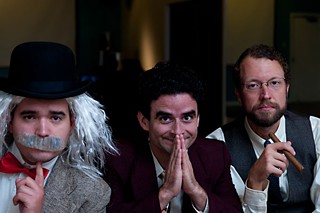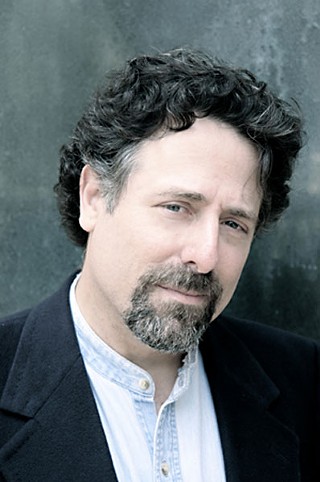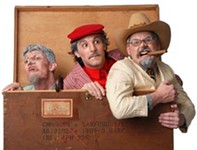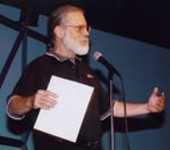'Eggheads'
Novelist Joseph Skibell reflects on his adventures in the screen trade that produced this screwball comedy
By Robert Faires, Fri., Sept. 6, 2013

If the sight of a midcentury office drone dreamily dancing his way from ancient Egypt to modern Manhattan tickled your fancy, perhaps you'd like to join a Broadway playwright on a train ride to Hollywood with three wisenheimers who act like the Marx Brothers but look like Franz Kafka, Sigmund Freud, and Albert Einstein. The former image came from one of Tongue and Groove Theatre's quirkiest efforts, the trippy musical travelogue Seven Wonders of the World (Plus One), revived delightfully last summer. The latter is from another past T&G hit, the equally loopy Eggheads, which Artistic Director David Yeakle has dusted off for a new run. Joseph Skibell, who penned this valentine to Thirties screwball comedy long before he became a noted novelist, reveals how the play came to be.
I wrote Eggheads when I was in my 20s. I was a struggling screenwriter living in a little bungalow near Venice Beach. I thought – based, admittedly, on a complete misunderstanding of reality – that I could support my work as a playwright with the money I'd make as a screenwriter. I didn't realize I'd be competing for writing jobs with people who actually wanted to make movies.
Still, things started out promisingly enough.
Fresh out of college, I'd written a screenplay called The Hometurning. It concerned a Harvard philosophy professor who returns home to Odessa, Texas, for Christmas after having not seen his redneck family for eight years. He's dreading the reunion but discovers that, in his absence, they've all become Hare Krishnas and are going about their lives, in the oil fields of west Texas, wearing saffron robes and quoting, in thick west Texas accents, from the Bhagavad Gita.
This was the early 1980s. Krishnas were in every airport in the country then. I thought the saffron robes might be cinematic.
Against all expectations, after only a few weeks in town, based upon this script, I had a manager and an agent at the William Morris Agency. The manager represented famous actors like John Malkovich and Willem Dafoe – I was their first writer client – and the agent was a tiny woman who, when we met, pounded her little fist against her enormous desk and declared, "This film will be made."
She'd read the script the night before, and she couldn't put it down. "I've never laughed so much in bed," she told me.
I bit my tongue, silencing the 1,001 comebacks that were on its tip.
A number of things happened. First, it turns out, I was wrong: Saffron robes weren't cinematic, and no one wanted to make a film about Gita-thumping rednecks in Texas. At every meeting I "took" – this was the parlance of the time – producers told me how much they loved my script, how original it was, how funny and bold, and then they wondered aloud if I couldn't perhaps write something, well, a little less ... weird.
"With your comic sensibility and a normal story," they all said more or less, "you can't fail."
The film Educating Rita was a big hit back then. In every meeting, the producers wondered: "Couldn't you write something like Educating Rita? Have you seen it? Oh, it's just great!"
I tried. I really did. I wrote two more screenplays while I was living in Los Angeles. But the truth is, I was too young, and I had no craft as a writer. I was like a character in a short story written by I.B. Singer and Nathaniel West, a Hollywood writer possessed by the wicked imp of a French surrealist. The more I tried to write Educating Rita, the weirder my scripts became. The next one, Eggheads, was a 1930s-style screwball comedy about a Preston Sturges-like playwright who, in order to pay his gambling debts after a major Broadway flop, is forced to work for a Hollywood studio. The entire script takes place on the train ride between New York and Los Angeles. The studio heads, sensing the playwright's reluctance, send three assistants to accompany him out west. Though these three act like the Marx Brothers, they actually seem to be Kafka, Einstein, and Freud. It was written in a hyper-driven version of the wisecracking dialogue of the genre.
In many ways, the script is a perfect representation, in symbols, of my mental state at the time. At 134 pages, though, it was too long for Hollywood.
"It's as long as the Bible," complained one of the few producers who bothered to read it.
Needless to say, no one took an interest in it, although it was a Sylvester Stallone film compared to my next script, which involved a ménage-a-trois between the Brothers Grimm and Dortchen, the wife of Wilhelm Grimm. Narrated from within Dortchen's womb by the yet-to-be-born child of this plural marriage, the story was, I thought, a tender meditation on innocence and experience.
After that, I was hired by the son of a famous movie star to make a screenplay out of an idea of his – but that's a story in itself. The last words I heard from him, back in 1992, were, "I'm reading the second draft now, and you'll hear from me in no more than two weeks."
I'm still waiting for that call.
And with that, my life as a screenwriter came to an end. Eventually, I stopped writing plays and became a novelist. As I look back upon them, my seven years in L.A. take on a Biblical sheen: I was like Jacob in the Book of Genesis, working seven years for Rachel and winding up with Leah. If I didn't get exactly what I wanted, I got much of what I need. By failing at it so miserably, I learned how to tell a story. This – it turns out – is all that matters in screenwriting.
And now, every decade or so, my old friend David Yeakle shows up and wonders if it'd be all right to stage Eggheads as a play. Every time I resist, and every time I give in. I even did a bit of revision on it this time, just a little, to shore up some structural weaknesses that appeared when the screenplay was renovated for the stage. And I confess: I even laughed as I read over it.
Still, it's odd to think that every decade or so Franklin and Smitty rise from their graves in the Cemetery of Unproduced Screenplays, ascend the boards and, alongside the G-Men and Uncles Sigmund, Albert, und Franz, and "the whole clowder of crazy cats," play out their dramatic lives for a month.
I hope they will amuse you. It's all they ever wanted, really.
Eggheads runs Sep. 6-14, Thursday-Sunday, 8pm, at Center Stage, 2826 Real. For more information, visit www.tongueandgroovetheatre.com.













